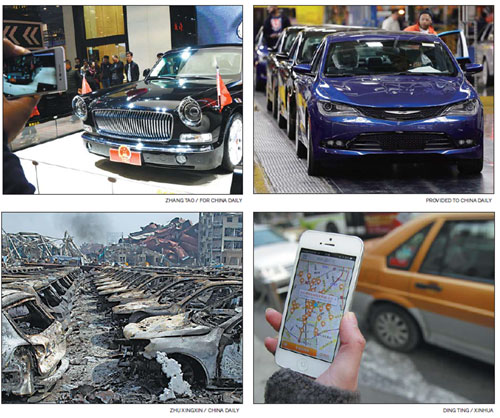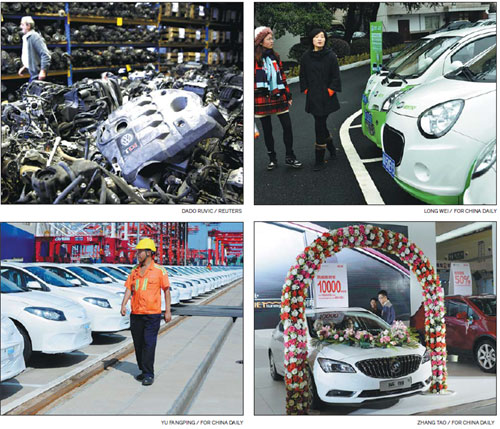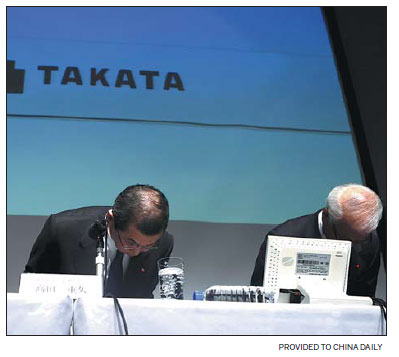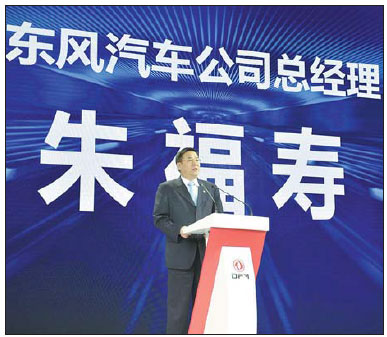Tumultuous year for motoring
China's new normal has affected a variety of sectors in the world's second-largest economy. China Daily reporters Du Xiaoying and Hao Yan look back at the auto industry's ten most important events in 2015.
GROWTH SLOWDOWN
Both production and sales of passenger cars saw considerable growth in September and October, but gone is the era of double-digit growth rates since China became the world's largest car market.
The China Association of Automobile Manufacturers predicted China's passenger car market would grow 3 percent this year, after a 14-percent annual expansion in 2013 and 7 percent growth in 2014. Chinese automakers gained this year after introducing cheaper sport utility vehicles.
Automakers believe demand for autos will remain strong and see the slowdown as normalizing. There are only seven cars for every 100 people in China, compared with 50 for every 100 in Germany and 80 for every 100 in the US.
TIANJIN BLASTS
The massive explosions in the port of Tianjin on Aug 12 destroyed thousands of imported cars.
As the fourth-largest port in the country and the closest to the capital, Tianjin is an important import hub for foreign automakers. According to Sohu.com, more than 55 percent of imported cars arrive in China through the port every year.
The explosions affected a dozen foreign automakers, including Volkswagen, Renault, Toyota and Hyundai, with total losses estimated at more than 2 billion yuan ($313.5 million).
The blasts delayed the deliveries of vehicles to customers. Some automakers rerouted their cars to other ports such as Shanghai or Qingdao.
EMISSIONS SCANDAL
In September, US regulators discovered that Volkswagen AG had installed software on its diesel engines that allowed its vehicles to evade pollution tests.
The company admitted that it fitted 11 million diesel vehicles with the software. Jochem Heizmann, president and CEO of Volkswagen Group China, said last month that the company will not cut its investment in China despite its economic losses after the scandal.
About 1,950 imported VW vehicles equipped with diesel engines in China have been affected.
Dong Yang, general secretary of the China Association of Automobile Manufacturers said in September that it will take Volkswagen 10 years to recover from the scandal.
PARALLEL-IMPORTS
Earlier this year, China allowed dealers to sell imported cars - called parallel imports - as part of the central government's overall effort to slash prices on expensive luxury vehicles, boost trade and competition, break up monopolies and offer consumers more choices.
Free trade zones in Shanghai and Tianjin as well as in Guangdong and Fujian provinces have now piloted parallel-import auto programs that allow independent auto dealers to directly import vehicles from a foreign production base, a gray market that has existed in China for years.
Sales figures have been lower than expected. The Ministry of Commerce said last week that parallel import auto companies applied for authorization to import 1,598 vehicles in 2015.
AIRBAG RECALLS
More than 3.8 million cars from nine different brands were recalled across the nation due to a number of safety issues involving airbags manufactured by Tokyo-based Takata Co.
China's quality watchdog has issued recalls on 41 imported and domestically produced models made from 1999 to 2014 from such brands as Honda, Toyota, Lexus, Nissan, Infiniti, Mazda, Subaru and BMW.
China's recalls began in April of last year, although Takata denied there were any casualties in China as a result of its airbags. More automakers are investigating their Takata supplied airbags.
An airbag is supposed to work for a car's lifetime, unless it is damaged in a flood. The reliability of an airbag is not among factors checked in regular maintenance examinations and there is no way to physically examine an installed airbag.
ANTITRUST
Chinese authorities fined global automakers and suppliers for violating antitrust laws after these companies imposed strict price restrictions on new car sales at authorized dealers.
Regulators levied a fine of about 350 million yuan ($54.8 million) on Daimler's Mercedes-Benz in April. In September, authorities fined FAWVolkswagen's luxury brand Audi almost 250 million yuan, Dongfeng Nissan nearly 123 million yuan and Chrysler almost 31.6 million yuan.
A number of authorized local dealers were also fined for the price-fixing violations.
The country is promoting legislation in the auto industry to better promote fair competition in the world's largest car market.
CAR-HAILING
Car-hailing service apps have become popular in major cities across China since last year, adding pressure on the traditional taxi industry. Authorities have frequently taken a stand against drivers who use their private cars in such services.
Earlier this month, the Ministry of Transport concluded its solicitation of public opinion in preparation for the drafting of regulations on car-hailing services. According to the draft, a license will be needed for drivers of private cars to offer rides for payment. The draft also intends to raise the income of taxi drivers.
The ministry received more than 6,000 opinions, with most discussing how car-hailing services should be managed and what should be required of the drivers and their cars.
NEV MARKET
Despite the overall sluggishness in China's auto market, the nation's new-energy vehicle market is skyrocketing at a growth rate of 290 percent year-on-year, with 171,145 NEVs sold through the first 10 months.
The market is strongly supported by government measures introduced this year to make new-energy vehicles, especially pure electric autos, more attractive to customers.
Industry experts believe the country has the potential to surpass the United States this year to be the largest electric car market in the world.
While some critics are worried that growth will slow when government incentives end in 2020, prices for hybrid vehicles are dropping and fuel cell cars are becoming more environmentally friendly than electric ones.
STIMULUS
After the State Council relaunched a tax deduction in October to encourage the purchase of passenger cars, the nation's sales volume reversed its downward trend within a month.
The tax was halved for buyers of new passenger cars with engines that are 1.6 liters or smaller.
The government called for the phaseout of gasoline vehicles that fall below the National I Emission Standard and diesel autos that fall below the National III standard by 2017.
Besides boosting sales of vehicles, the State Council hopes its actions will also promote restructuring in the auto manufacturing industry and eliminate heavy polluting vehicles from the nation's streets.
ANTI-CORRUPTION
China stepped up its anti-corruption measures and announced this month that Zhu Fushou, the former general manager of Dongfeng Motor, was under investigation for suspected regulation violations. Vice-president Ren Yong has been under investigation since December of last year.
The nation's watchdog said more than 50 former management members in the group were in violation of regulations, including executives at Dongfeng Honda and other subsidiaries.
Former chairman of Dongfeng, Xu Ping, has filled in as FAW chairman since May, after it was announced in March the former chairman of FAW was under investigation.
FAW-VW and FAW-Audi's former deputy general managers are also being investigated. FAW's former general manager, deputy general manager were tried and sentenced in 2014.



|
Zhu Fushou, former general manager of Dongfeng Motor, is under investigation for suspected regulation violations. Provided To China Daily |
(China Daily 11/20/2015 page18)















